Overview
In the demanding world of healthcare, providers often face overwhelming administrative burdens that can detract from their ability to deliver compassionate care. This is where an AI scribe app can make a significant difference. By streamlining documentation processes, these apps not only enhance operational efficiency but also allow healthcare professionals to focus more on their patients.
Imagine a scenario where time is saved on documentation, leading to improved accuracy in patient records. This efficiency can optimize billing processes, reduce burnout among providers, and foster better communication within the healthcare team. Moreover, the ability to customize the app to fit unique practice needs ensures that each provider can tailor the solution to their specific challenges.
These benefits collectively contribute to a more compassionate and effective healthcare environment. As we navigate the complexities of patient care, embracing technology like AI scribe apps can help us create a supportive atmosphere for both providers and patients alike. Are you ready to explore how this innovative solution can transform your practice?
Introduction
In the ever-evolving landscape of healthcare, many providers face emotional challenges as they juggle the demands of patient care and administrative tasks. The integration of artificial intelligence offers a transformative solution, alleviating these burdens and ultimately enhancing patient care. CosmaNeura stands at the forefront of this revolution, providing AI-driven solutions that streamline documentation, billing, and communication.
Imagine reclaiming valuable time to focus on what truly matters—compassionate patient interactions. By automating essential processes, healthcare professionals can shift their attention back to their patients, fostering deeper connections and better outcomes. As the demand for efficient, ethical care continues to rise, the role of AI in streamlining operations becomes increasingly vital. It promises improved accuracy and efficiency while reinforcing the ethical standards that underpin Catholic healthcare.
This article delves into the multifaceted benefits of AI scribe applications. How are they reshaping the healthcare experience for both providers and patients alike? Join us as we explore these solutions and encourage a renewed commitment to compassionate care.
CosmaNeura: Streamline Administrative Tasks for Enhanced Patient Care
At CosmaNeura, we understand the emotional challenges that healthcare providers face daily. The burden of administrative tasks can weigh heavily, detracting from the vital support you provide to your patients. Our mission is to alleviate these pressures by incorporating the ai scribe app into medical services, which is specifically designed to reduce the administrative challenges encountered by primary providers. By automating essential processes such as appointment scheduling, medical record management, and billing, our platform allows you to devote more time to what truly matters: supporting your patients. This transition not only improves operational efficiency but also aligns with the ethical principles of Catholic teachings, ensuring that assistance remains compassionate and centered on the needs of those you serve.
As we look ahead, nearly 90% of medical executives anticipate that connected service delivery will shape their strategies in 2025. This makes the integration of AI into administrative tasks not just beneficial but crucial. Consider the success stories of AI implementations, such as a diagnostic center that reduced processing times by 50% while enhancing accuracy. These examples illustrate the transformative potential of AI in revolutionizing medical operations. By streamlining administrative tasks through the ai scribe app, CosmaNeura not only boosts your efficiency as practitioners but also enhances the overall quality of patient care, embodying the compassionate spirit of Catholic service. Imagine a future where you can focus more on patient interactions rather than paperwork. With CosmaNeura, that future is within reach. Let’s work together to create that prioritizes compassionate care while embracing innovative solutions. How can we support you in this journey?
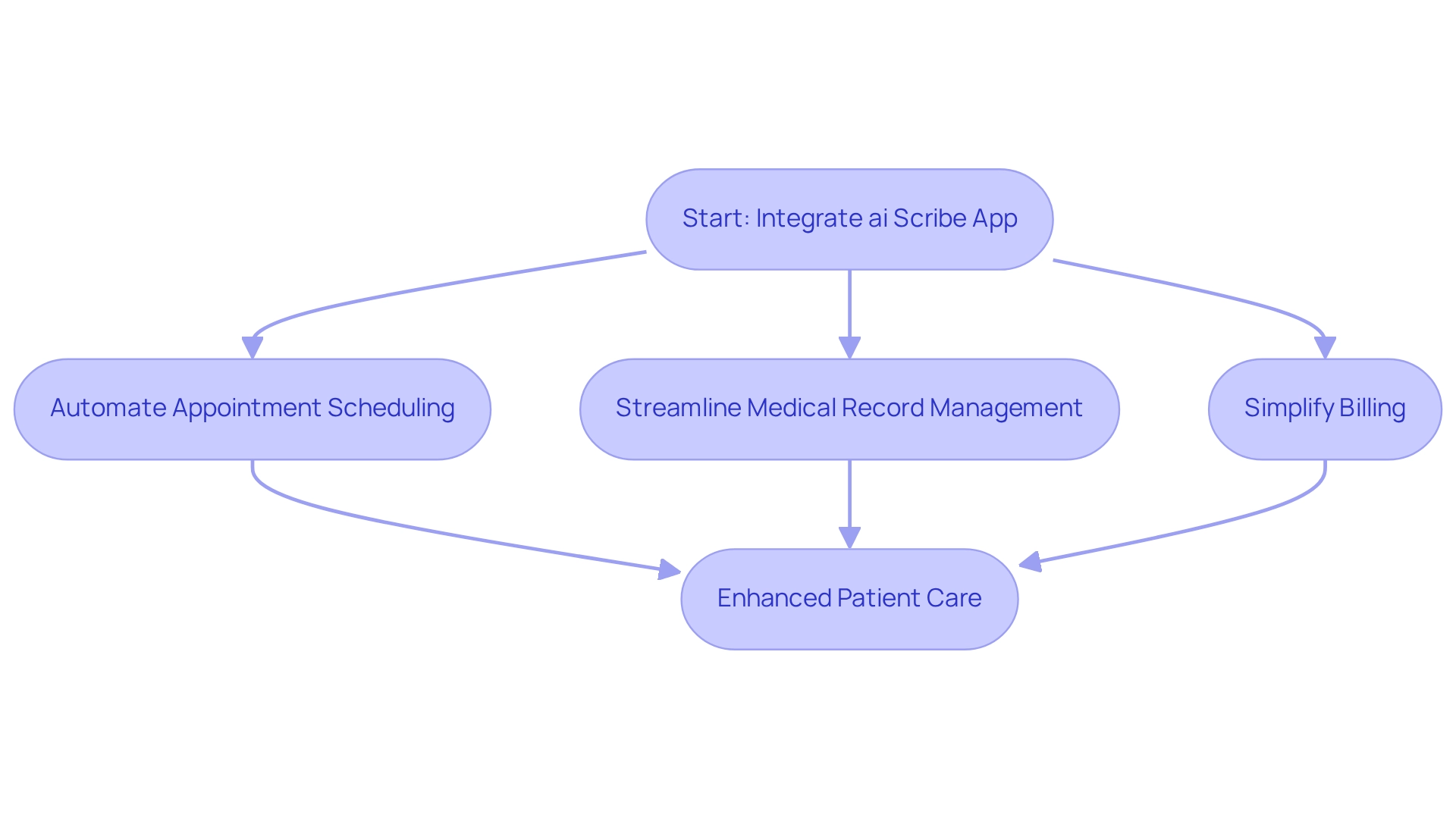
Time Efficiency: Reclaim Hours with Automated Documentation
AI scribe apps are reshaping documentation in the medical field, addressing the emotional challenges healthcare providers face. By significantly reducing the time clinicians spend on administrative tasks—like appointment scheduling and medical record management—these tools offer a solution to a common burden. Imagine reclaiming an average of 3 to 5 hours each week! This newfound time allows caregivers to focus more on their interactions with individuals, fostering deeper engagement and enhancing overall outcomes.
The thoughtful application of AI technology not only simplifies workflows but also elevates the quality of care provided. With more time to dedicate to individual needs, professionals can channel their expertise and compassion where it matters most. As industry specialists emphasize, the incorporation of AI scribes supports the vital face-to-face interactions that both physicians and individuals cherish during appointments. This ultimately leads to a more fulfilling healthcare experience.
Moreover, statistics reveal a profound impact: can reduce hospital admissions by over 50%. How does this happen? More efficient documentation enables improved resource allocation and management of individuals. The advantages of automated documentation extend beyond mere time efficiency; they also enhance job satisfaction among professionals. A more balanced workload allows them to adhere to ethical standards in healthcare while feeling fulfilled in their roles, and the AI scribe app from CosmaNeura is transforming medical service delivery by alleviating the administrative load. They tackle key challenges and enhance patient-focused support. Are you ready to explore how these innovations can transform your practice and improve the care you provide?
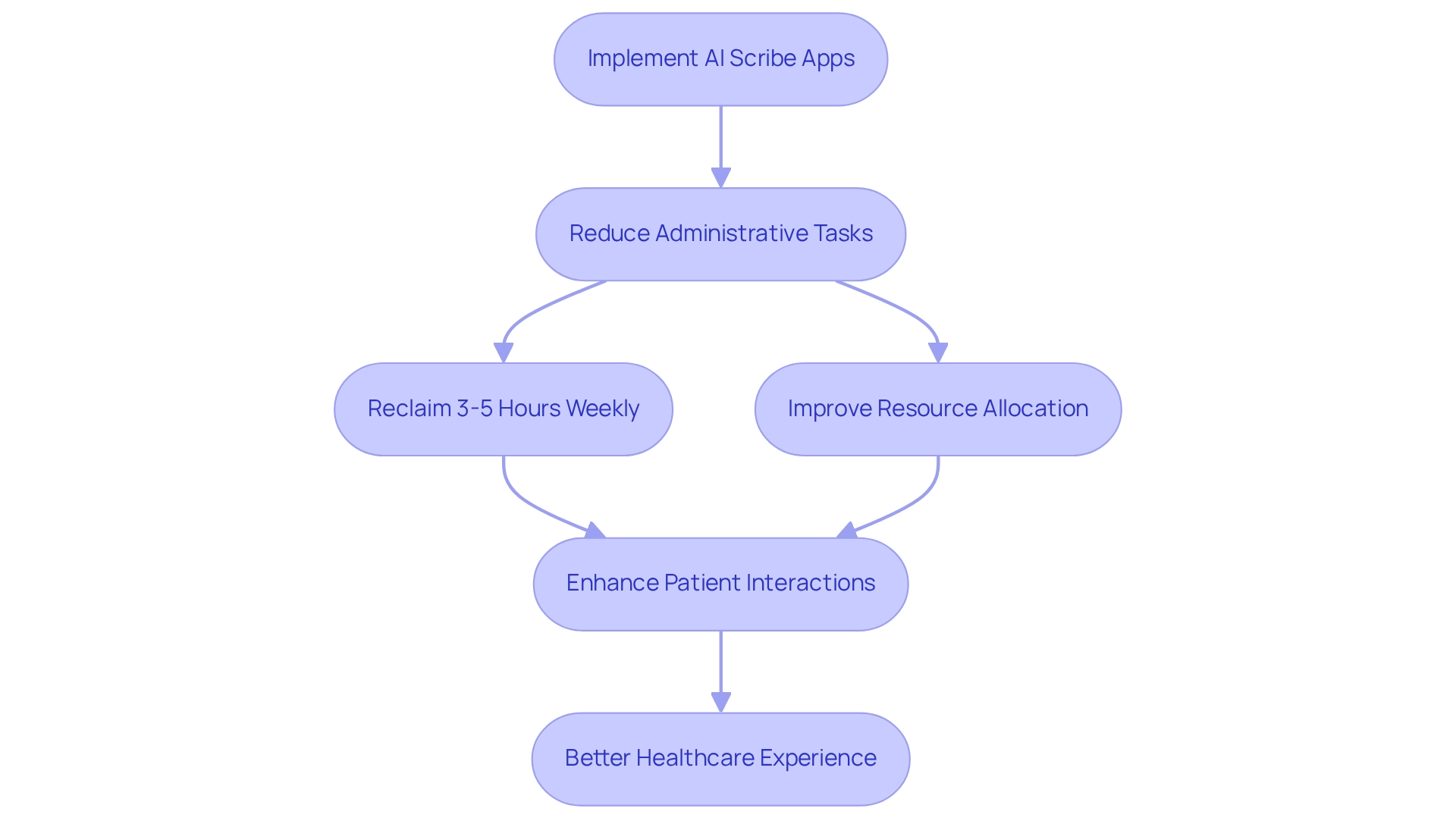
Improved Accuracy: Ensure Precise Clinical Documentation
In the demanding world of healthcare, professionals often face emotional challenges due to overwhelming administrative tasks. AI-powered scribe applications, such as , emerge as a beacon of hope, significantly enhancing the accuracy of clinical documentation. By leveraging sophisticated algorithms, these tools transcribe conversations and generate comprehensive notes with impressive accuracy rates of 95% to 98%. This remarkable precision far surpasses traditional manual documentation methods.
Imagine reclaiming approximately 80% of the time typically spent on transcription tasks. This potential time savings allows medical professionals to focus more on what truly matters—patient care. Increased accuracy not only reduces the likelihood of mistakes that could jeopardize safety but also ensures that medical providers have access to trustworthy and prompt information.
Moreover, by streamlining processes such as appointment scheduling and medical record management, AI solutions alleviate the administrative burdens that often detract from patient care. Yet, it’s crucial to recognize that 39% of respondents express concern about AI's impact on the patient-physician relationship. Addressing these concerns is vital for overcoming resistance to innovation in the medical field.
The incorporation of AI in clinical documentation is revolutionizing workflows. A case study titled 'Top Use Cases for AI Medical Transcription and Medical Scribes' illustrates how the ai scribe app enhances clinical documentation quality and simplifies workflows within medical environments. This transformation ultimately tackles the issues of innovation resistance among medical professionals, paving the way for a more compassionate and efficient healthcare experience.
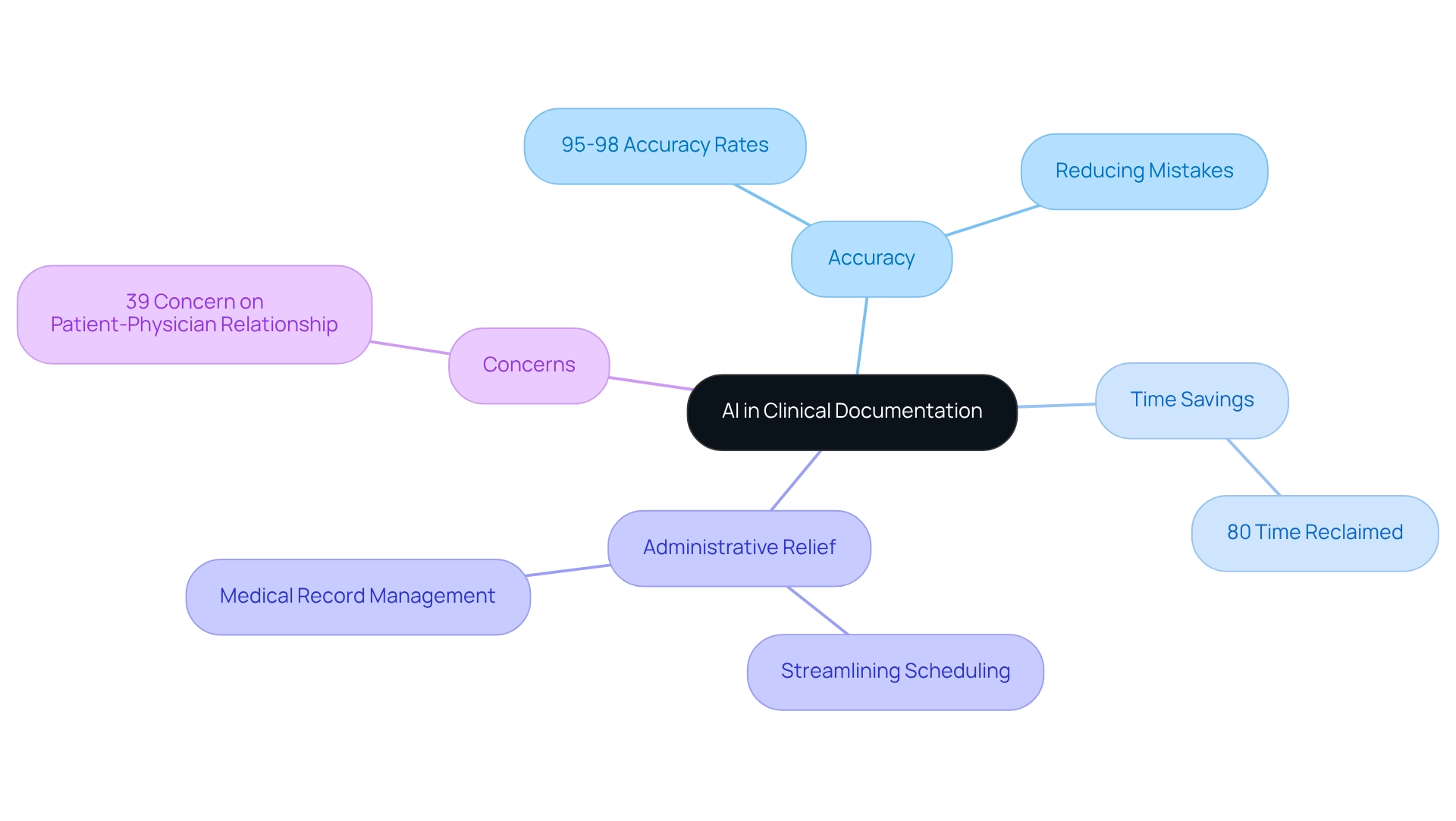
Billing Optimization: Maximize Revenue with AI-Driven Suggestions
Healthcare providers often face that can detract from the quality of patient care. The AI scribe app significantly enhances billing processes by accurately suggesting billing codes derived from clinical documentation. This functionality not only maximizes revenue potential for each client visit but also uncovers retrospective billing opportunities. By doing so, medical professionals can truly capitalize on all possible income streams, allowing them to focus more on what matters most—their patients.
Imagine being able to streamline your billing practices while enhancing your financial health. Statistics indicate that AI's proactive approach to denial management can increase the chances of first-time claim approval, solidifying its role in optimizing revenue. Moreover, AI expedites the resolution process for denied claims by identifying root causes and offering corrective actions, which is crucial for maintaining cash flow.
Consider the impact of predictive analytics in evaluating historical billing data. This capability enables medical practitioners to modify their billing strategies proactively, thus reducing revenue loss and enhancing collections. As a result, the integration of the AI scribe app in billing processes not only enhances accuracy but also contributes to a more sustainable financial model for medical practices.
As noted by MediBillMD, "we invest in the ongoing education of our team so they stay updated on the industry updates." This highlights the importance of training in effectively utilizing AI tools. By embracing this comprehensive approach, medical professionals can fully leverage AI's capabilities for optimal revenue management. Are you ready to explore how these tools can transform your practice and improve patient care?
Reduced Burnout: Enhance Job Satisfaction for Healthcare Providers
Healthcare professionals often face emotional challenges, including burnout and overwhelming administrative tasks. The adoption of the AI scribe app can significantly alleviate these burdens, allowing practitioners to focus more on patient care. As they spend less time on paperwork, they experience a rise in job satisfaction and overall mental well-being. This reduction in stress not only enhances their work experience but also leads to improved quality of treatment for individuals.
However, many healthcare professionals are understandably hesitant to embrace innovation. Concerns about how new technologies might affect client treatment and their workflow are common. It’s essential to address these worries to facilitate successful integration. Expert insights suggest that ambient documentation is one of the most effective methods for enhancing the user experience.
A case study from MultiCare illustrates the positive impact of . Clinicians using these technologies reported a remarkable 64% improvement in work-life balance. This enhancement is directly tied to increased job satisfaction and better care for individuals. Such findings highlight the efficiency of these tools in fostering a healthier, more engaged workforce in the medical field.
By acknowledging these common challenges and exploring supportive solutions, we can overcome the initial reluctance many practitioners feel towards innovation. Embracing the AI scribe app not only benefits healthcare providers but also ultimately enhances patient care. Have you considered how these tools could transform your daily practice and improve your well-being?
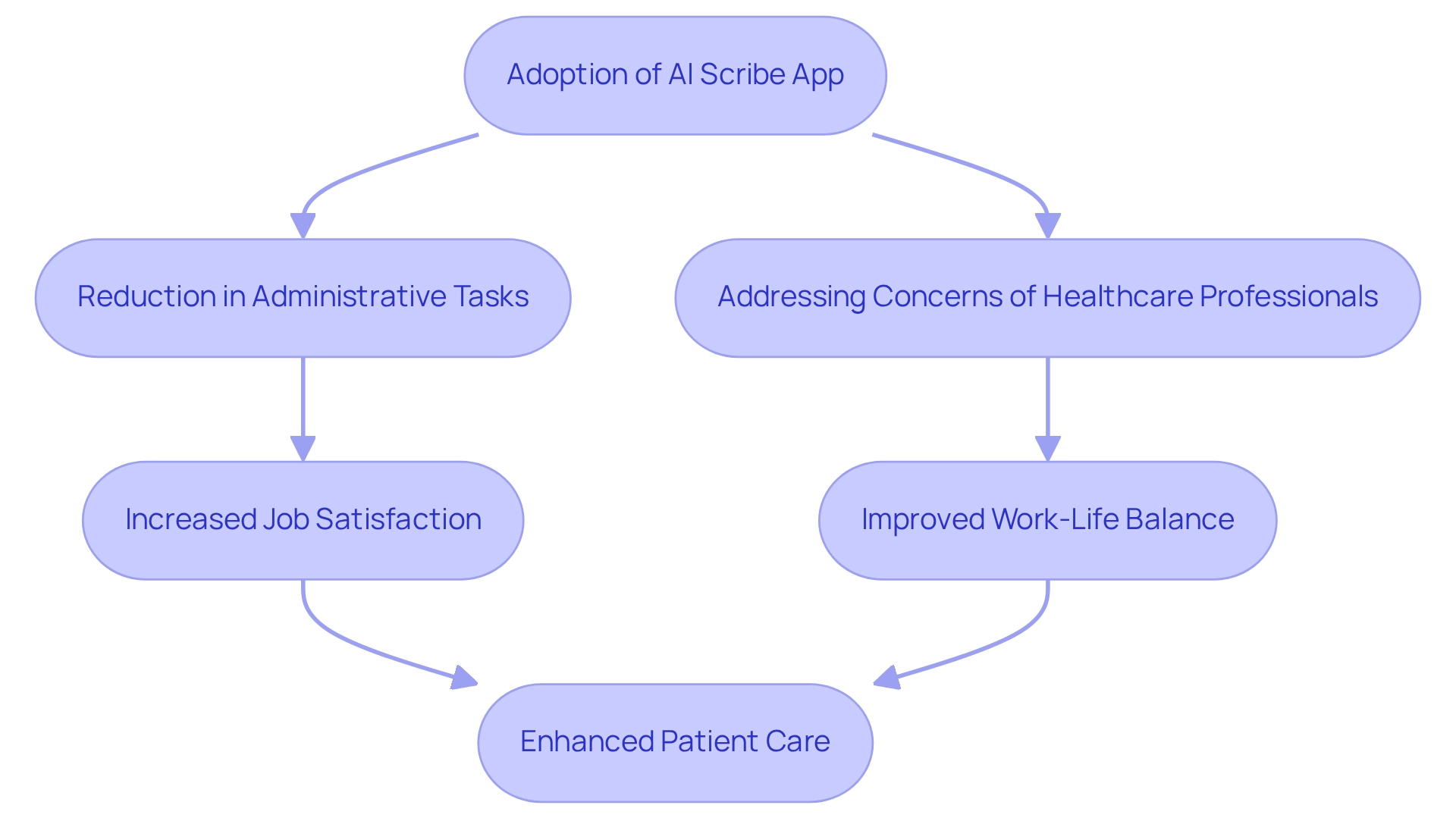
Telehealth Support: Real-Time Transcription for Remote Consultations
is transforming telehealth consultations by offering real-time transcription, ensuring that all critical information is accurately captured and documented. This capability significantly enhances the quality of remote interactions, allowing medical providers to prioritize patient engagement over administrative tasks. As telehealth usage continues to rise, with a significant increase in demand for accessible medical services, the integration of AI into these workflows becomes essential.
Have you ever felt overwhelmed by the administrative burdens that can detract from patient care? Statistics indicate that AI can significantly cut costs associated with hiring human scribes or transcription services, making it a financially viable option for many practices. Moreover, involving medical professionals in the creation and execution of AI tools can alleviate concerns about reliability and job displacement, ultimately leading to greater acceptance rates.
Expert insights highlight the importance of real-time transcription in telehealth. It not only streamlines documentation but also mitigates clinician burnout by freeing up valuable time previously spent on paperwork. By enhancing telehealth consultations, the AI scribe app empowers healthcare professionals to provide more focused and compassionate care. This initiative aims to lessen the administrative load on physicians, improve efficiency in clinical documentation, and possibly ease burnout, ultimately transforming service delivery and enhancing outcomes for individuals.
Furthermore, addressing challenges such as the division of medical systems and regulatory concerns is vital, as these elements often obstruct efficient communication and collaboration among practitioners. Acknowledging the resistance to innovation among medical professionals is also crucial, as it emphasizes the necessity for careful execution of AI solutions that prioritize quality service and client interactions.
Let’s explore how we can embrace these advancements together, ensuring that technology serves to enhance the compassionate care we provide to our patients.
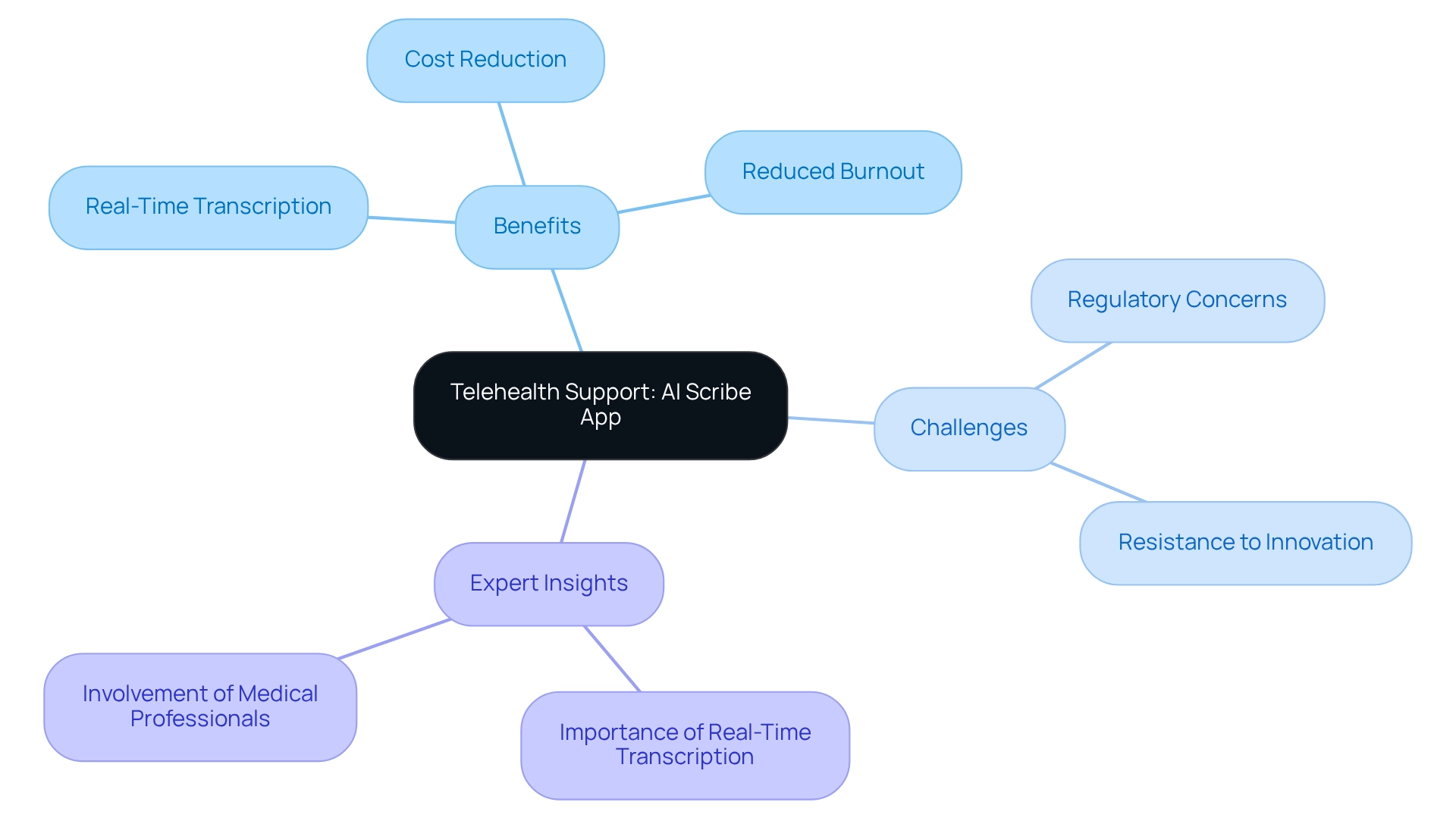
Diagnostic Assistance: Enhance Clinical Decision-Making with AI Insights
The ai scribe app is essential for supporting medical professionals as they navigate the complexities of clinical decision-making. By carefully analyzing individual interactions and providing diagnostic suggestions, these tools empower providers to make informed decisions promptly. This not only enhances health outcomes but also improves the overall quality of care.
Imagine a world where healthcare professionals can seamlessly integrate insights from an AI scribe app into their workflows, allowing them to enhance their diagnostic capabilities and focus more on patient care. In fact, up to 71% of radiology residents believe AI education in medical schools is essential for understanding its applications. This growing acknowledgment of AI's potential highlights its ability to empower clinicians and enhance diagnostic accuracy.
As AI technology continues to evolve, it promises innovative solutions that foster individual engagement and understanding of health management, ultimately promoting better health outcomes. A compelling case study illustrates how AI can provide personalized health information and guidance, enriching individuals' comprehension of their health management journey.
Moreover, AI-driven remote monitoring facilitates continuous observation of vital signs, such as heart rate, blood pressure, and oxygen saturation. This proactive approach, combined with early intervention strategies, is crucial for improving patient safety and outcomes. Experts emphasize the importance of human oversight in AI-driven interventions to ensure their appropriateness and effectiveness. Striking a balance between technological support and clinical expertise is essential for maintaining high standards of patient care while embracing the advantages of .
In light of these developments, incorporating AI into medical education is paramount. It equips future practitioners with the skills to use these tools effectively and ethically, addressing the concerns of those who may be hesitant to adopt new technologies. Together, we can foster a healthcare environment where technology and compassion coexist, ultimately leading to better patient care and outcomes.
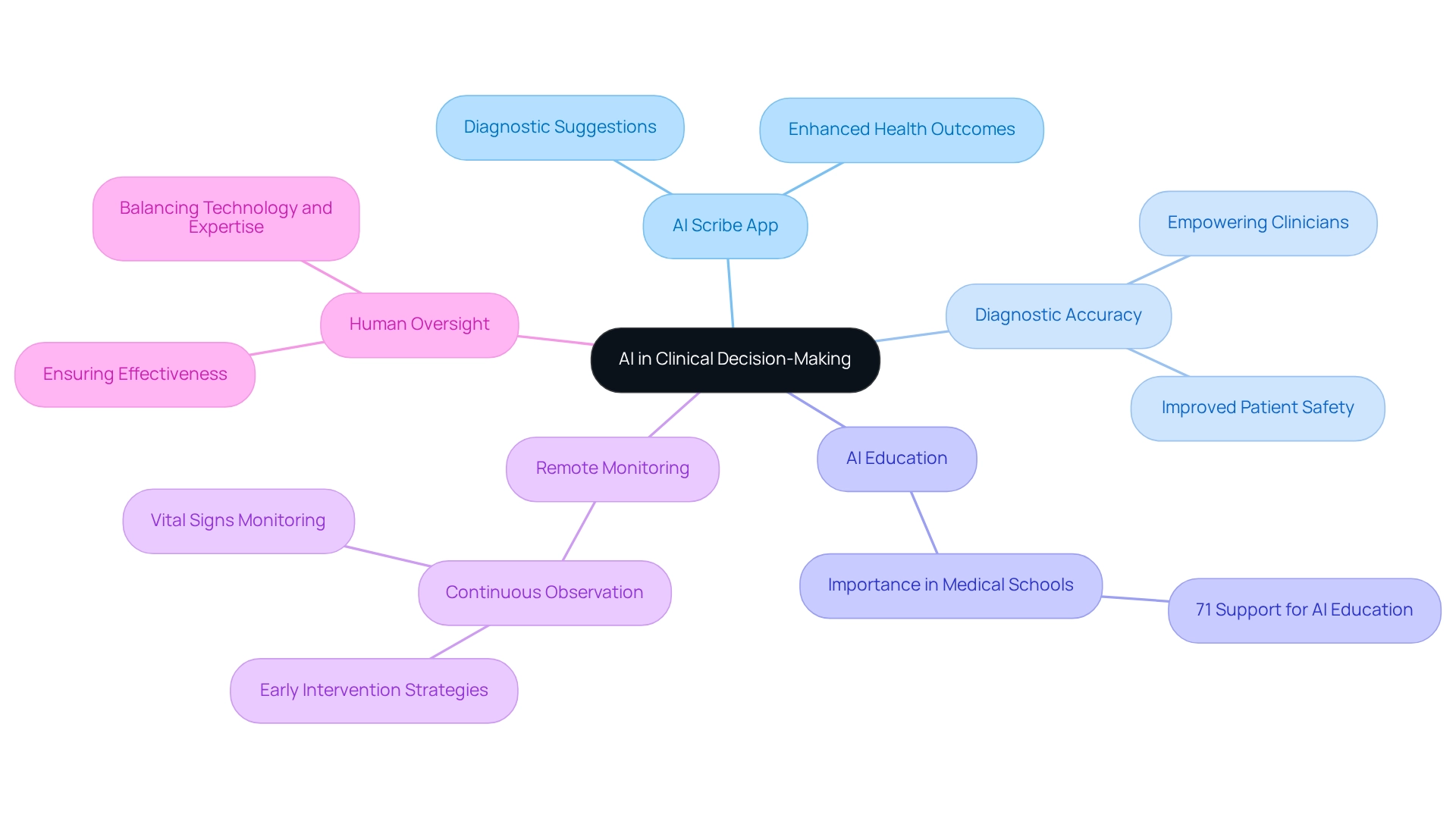
Customization: Tailor AI Scribes to Fit Unique Practice Needs
Healthcare providers often face emotional challenges as they navigate the complexities of patient care. The administrative burdens can weigh heavily, impacting their ability to focus on what truly matters: their patients. offers extensive customization choices, allowing medical practitioners to tailor technology to their specific practice needs. By modifying note templates and seamlessly integrating with existing workflows, the AI scribe app enhances clinical processes rather than disrupting them. This adaptability is essential for maximizing the effectiveness of AI across various healthcare environments.
A recent KLAS Spotlight Report highlighted that tailored AI solutions significantly improve provider efficiency. DeepScribe, for instance, achieved an impressive performance score of 98.8 out of 100. Practices reported a notable increase in productivity, illustrating the practical benefits of customization. How might this technology transform your daily routine? For example, DeepScribe's effectiveness in oncology showcases how tailored solutions can meet the specific needs of different specialties, ensuring that the technology supports clinicians in delivering exceptional patient care.
As the medical field continues to evolve, the ability to customize the AI scribe app to suit specific practices will be a key factor in its successful implementation and overall impact on service delivery. Dr. Terrance Wickman, a Kidney and Liver Transplant specialist, expressed it well: "I’ve been able to organize my life in a way that makes me feel more at ease to be honest with you." This sentiment resonates with many in the field.
Furthermore, customization not only streamlines documentation but also aligns with ethical practices, reinforcing the commitment to Catholic teachings in the medical field. Imagine a world where technology not only supports your work but also enhances your ability to provide compassionate care. Embracing these innovations can lead to a more fulfilling practice and improved patient outcomes.
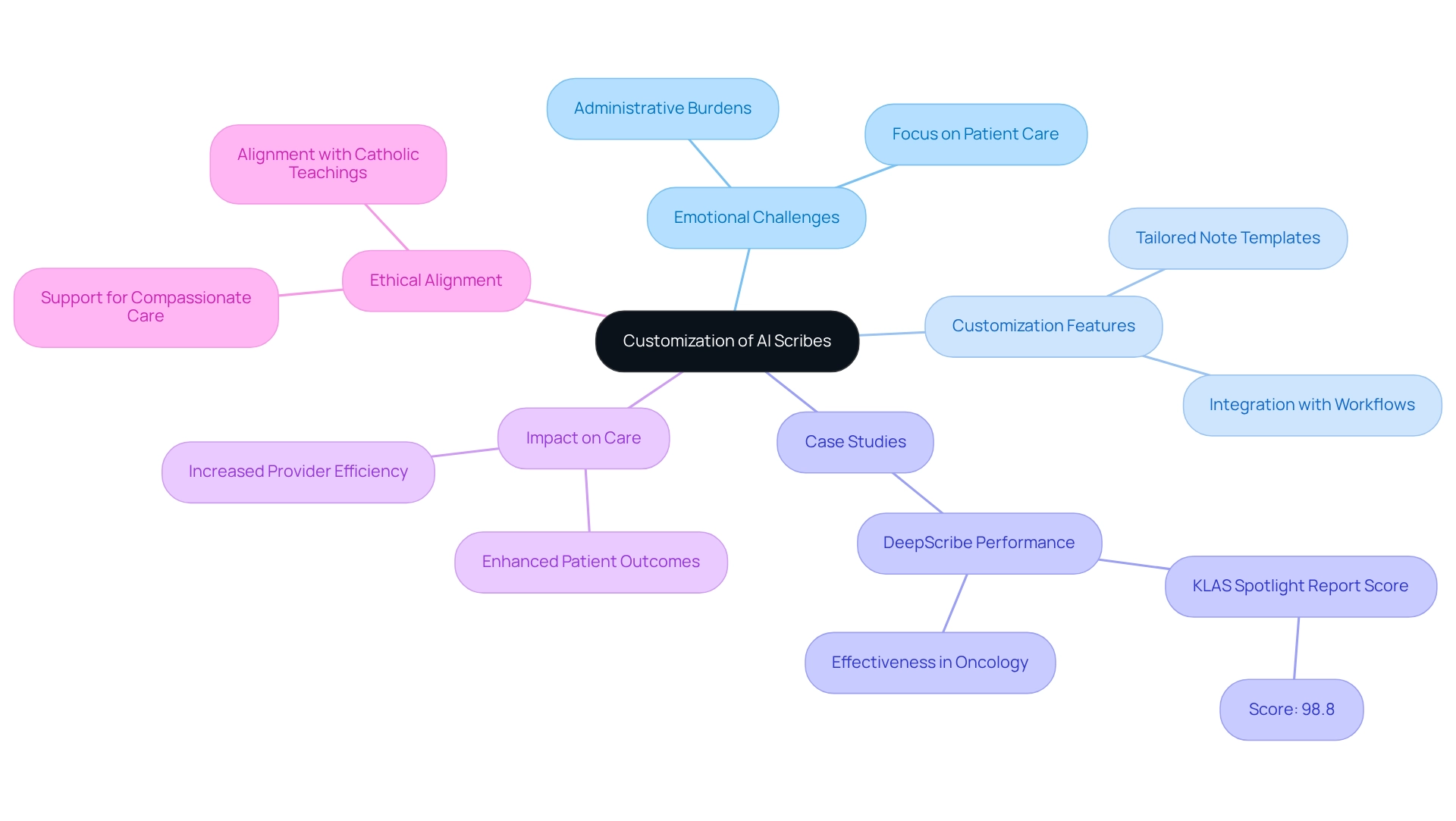
Enhanced Communication: Foster Collaboration Among Healthcare Teams
The ai scribe app significantly enhances communication among healthcare teams by efficiently organizing and sharing clinical notes. This functionality ensures that all team members have real-time access to the same information, facilitating coordinated care. By removing communication obstacles, AI promotes a more cohesive approach to managing individuals, ultimately resulting in better outcomes.
Consider the emotional toll that healthcare providers face. A recent pilot program introduced a generative AI tool to address the 57% increase in electronic messages since the COVID pandemic. This tool transforms incoming messages into editable drafts, saving time for users and enhancing communication efficiency. As medical practitioners increasingly adopt AI's potential, they position themselves as leaders in shaping a future where innovative technologies enhance their dedication to .
However, it is crucial to acknowledge that many medical professionals may initially oppose such innovations due to worries about preserving the quality of service and interactions with individuals. How can we address these concerns? Through education and demonstrating the tangible benefits of AI, we can help alleviate fears and encourage adoption. As Participant 3, a senior staff nurse, noted, "Anticipating and embracing AI's potential positions us as pioneers in shaping nursing's future." This viewpoint emphasizes the significance of AI in improving communication while adhering to the ethical standards and dedication to patient well-being that medical practitioners uphold.
Statistics suggest that the ai scribe app can lead to substantial enhancements in communication among medical teams, emphasizing the significance of collaboration in providing top-notch service. Let us embrace these innovations together, ensuring that we continue to prioritize compassionate care in our evolving healthcare landscape.
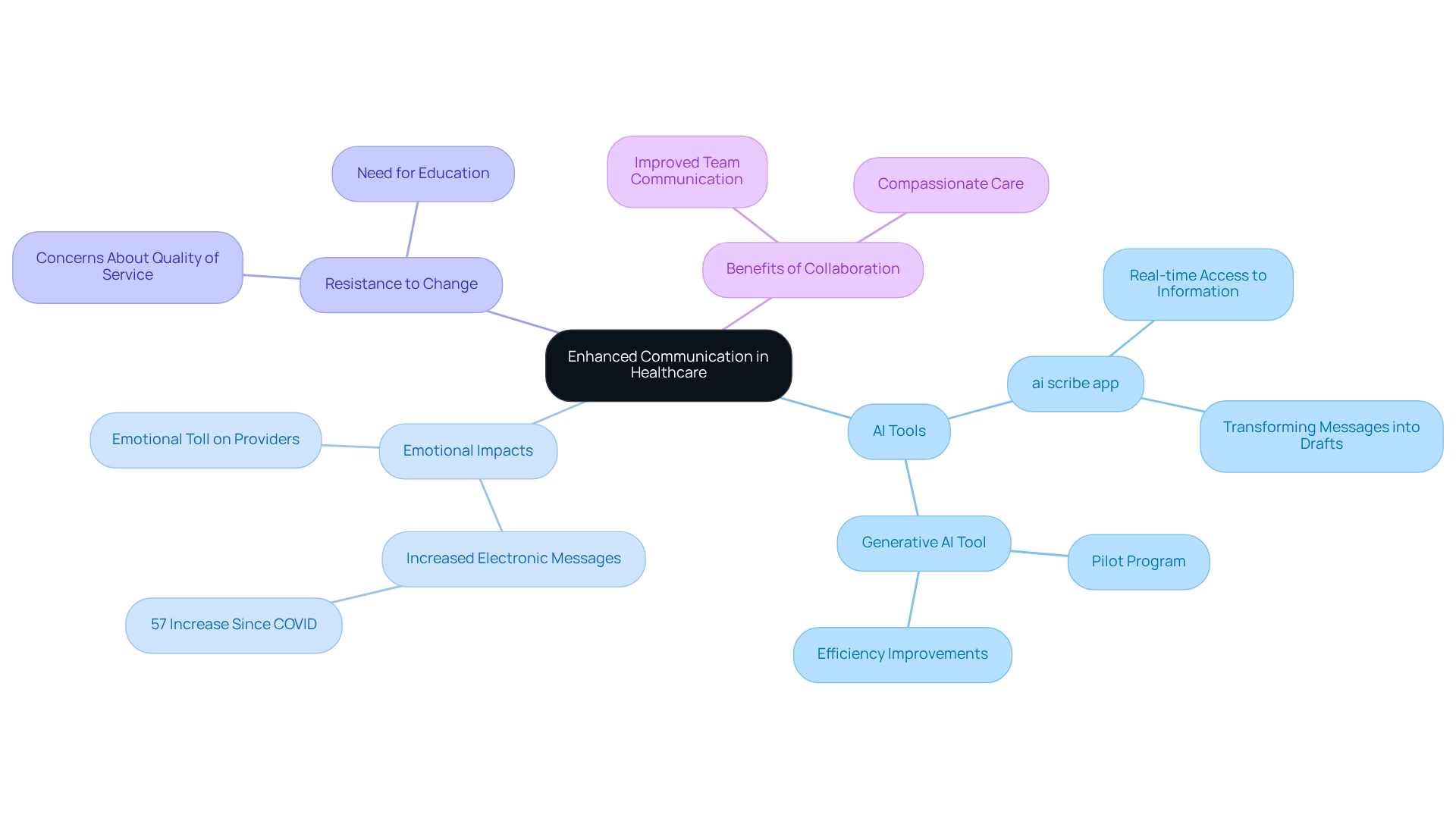
Ethical Compliance: Uphold Standards in Faith-Based Healthcare
In the demanding world of healthcare, practitioners often face emotional challenges that can hinder their ability to provide the best care. CosmaNeura's AI scribe app is thoughtfully designed to uphold the highest ethical standards in faith-based medical services, ensuring that all AI suggestions align with Catholic teachings. This allows practitioners to utilize this technology with confidence, knowing it supports morally responsible treatment for individuals.
By reinforcing the integrity of medical practices, CosmaNeura cultivates trust between patients and providers. As the only organization dedicated to developing AI solutions for the faith-oriented medical sector, we demonstrate how technology can enhance ethical standards while offering exceptional support. Our quality evaluation process is a key driver of success, ensuring that each feature we develop meets the highest benchmarks for effectiveness and reliability.
Consider the case study titled 'Setting the Benchmark in Catholic Health Services.' It illustrates how enhance the quality of support and reflect the compassionate spirit of Catholic health services. While the integration of AI in medical services marks a significant advancement, we must also recognize the high costs associated with initial investment and maintenance, which can be challenging for smaller organizations. Additionally, the risk-averse nature of many physicians may create barriers to adopting these innovative solutions.
Ultimately, incorporating AI is not merely a technological progress; it signifies a transformative change that honors and embodies the compassionate essence of Catholic medical services. This change enables physicians to improve care for individuals and enhance operational efficiency. We encourage healthcare providers to explore the potential of the AI scribe app to elevate their practices and enrich patient interactions.
Conclusion
The integration of AI scribe applications in healthcare offers a profound opportunity to transform patient care. By automating administrative tasks like documentation, billing, and communication, platforms such as CosmaNeura enable healthcare providers to reclaim valuable time. This time can be redirected towards meaningful interactions with patients, reinforcing the compassionate ethos central to Catholic healthcare.
As the healthcare landscape evolves, the advantages of AI become increasingly evident. From enhancing accuracy in clinical documentation to streamlining billing processes, AI solutions are vital in improving both care quality and provider satisfaction. By addressing clinician burnout, these technologies create a healthier work environment, ultimately leading to better patient outcomes.
Ethical considerations surrounding AI integration are crucial, particularly in faith-based healthcare settings. CosmaNeura's dedication to upholding Catholic teachings ensures that these advancements align with the moral standards of patient care. Embracing AI allows healthcare professionals to enhance their operational capabilities while remaining committed to compassionate, patient-centered care.
In closing, the transformative potential of AI scribe applications marks a new era in healthcare delivery. By alleviating administrative burdens and prioritizing patient engagement, AI streamlines workflows and strengthens the ethical foundation of healthcare practices. As the industry progresses, integrating AI will be essential in fostering a more compassionate and efficient healthcare system, ultimately enriching the lives of both providers and patients alike.




